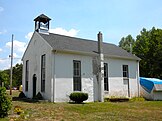Wikipedia:Main Page history/2023 February 15b
From today's featured article
The UEFA Euro 2020 final was a football match between England and Italy that took place at Wembley Stadium (pictured) in London, England, on 11 July 2021 to determine the winner of UEFA Euro 2020, which had been delayed a year due to the COVID-19 pandemic. Italy won their second European Championship, beating first-time finalists England 3–2 in a penalty shoot-out following a 1–1 draw after extra time. England's Luke Shaw opened the scoring in the second minute of the match, the fastest goal ever scored in a European Championship final, only for Leonardo Bonucci – who was later named the man of the match – to equalise midway through the second half. England had a 2–1 advantage in the shoot-out after two kicks each, but Italy came back to win. The event was marred by crowd disorder and incidents of violence; the English Football Association was punished by UEFA. Racial abuse on social media directed at England's final three, unsuccessful, penalty takers led to a police investigation. (Full article...)
Did you know ...
- ... that the Bethel African Methodist Episcopal Church (pictured) in Springtown, New Jersey, was used by Harriet Tubman to help fugitive slaves escape?
- ... that academic Muhammad Musa'ad was barred from running as a candidate in the Papuan gubernatorial election due to his Arabic ancestry?
- ... that Damen, despite being one of the busiest stations on the Chicago "L", lacks accessibility for the disabled?
- ... that the BBC documentary India: The Modi Question, which examines the career of Indian prime minister Narendra Modi, was banned in India?
- ... that Lucien Laurent scored the first goal in FIFA World Cup history during the inaugural game of Group 1 of the 1930 World Cup?
- ... that Grace Lavery's autobiography Please Miss discusses her transition but also the "paradigmatic concept of the penis"?
- ... that the Arizona Coyotes ice hockey team objected to a new host on the Phoenix radio station that carried their games, leading to his removal after a week?
- ... that Alexis Soyer's dish of lamb cutlets Reform is still on the menu at the Reform Club?
In the news
- Cyclone Gabrielle (satellite image shown) causes widespread damage and flooding across New Zealand.
- In American football, the Kansas City Chiefs defeat the Philadelphia Eagles in the Super Bowl.
- A megadrought and heatwave cause forest fires and a state of emergency in Chile.
- An earthquake strikes Turkey and Syria, killing over 41,000 people and injuring more than 120,000 others.
- In the Monaco general election, the incumbent UNM party led by Brigitte Boccone-Pagès wins all 24 national council seats.
On this day
February 15: National Flag of Canada Day (1965); Statehood Day in Serbia (1804)
- 1113 – Pope Paschal II issued the papal bull Pie postulatio voluntatis, formally recognising the establishment of the Knights Hospitaller.
- 1493 – Christopher Columbus wrote a letter widely distributed upon his return to Portugal that announced the results of his first voyage to the Americas.
- 1900 – Second Boer War: British cavalry led by John French defeated Boer forces to end a 124-day siege of Kimberley in present-day South Africa.
- 1942 – Second World War: Japanese forces led by General Tomoyuki Yamashita captured Singapore with the largest surrender of British-led military personnel in history.
- 2013 – A meteor exploded (video featured) over Chelyabinsk Oblast, Russia; the resulting shock wave injured about 1,500 people.
- Ibn Tabataba (d. 815)
- V. A. Urechia (b. 1834)
- Roger B. Chaffee (b. 1935)
Today's featured picture

|
"We Can Do It!" is an American Second World War poster produced by J. Howard Miller in 1943 for Westinghouse Electric as an inspirational image to boost female worker morale. It depicts a woman in a blue work shirt and a red-and-white polka-dot bandana flexing her right biceps while looking out at the viewer, with the title "We Can Do It!" in a speech bubble at the top of the poster. No more than 1,800 copies were printed. It was not initially seen beyond several Westinghouse factories in East Pittsburgh, Pennsylvania, and the midwestern U.S., where it was scheduled to be displayed for two five-day work weeks starting Monday, February 15, 1943. The poster was little seen during the war, but was rediscovered in the early 1980s and widely reproduced in many forms, often also called "Rosie the Riveter" after the iconic figure of a strong female war production worker. The image was used to promote feminism and other political issues beginning in the 1980s. Poster credit: J. Howard Miller; restored by Adam Cuerden
Recently featured:
|
Other areas of Wikipedia
- Community portal – The central hub for editors, with resources, links, tasks, and announcements.
- Village pump – Forum for discussions about Wikipedia itself, including policies and technical issues.
- Site news – Sources of news about Wikipedia and the broader Wikimedia movement.
- Teahouse – Ask basic questions about using or editing Wikipedia.
- Help desk – Ask questions about using or editing Wikipedia.
- Reference desk – Ask research questions about encyclopedic topics.
- Content portals – A unique way to navigate the encyclopedia.
Wikipedia's sister projects
Wikipedia is written by volunteer editors and hosted by the Wikimedia Foundation, a non-profit organization that also hosts a range of other volunteer projects:
-
Commons
Free media repository -
MediaWiki
Wiki software development -
Meta-Wiki
Wikimedia project coordination -
Wikibooks
Free textbooks and manuals -
Wikidata
Free knowledge base -
Wikinews
Free-content news -
Wikiquote
Collection of quotations -
Wikisource
Free-content library -
Wikispecies
Directory of species -
Wikiversity
Free learning tools -
Wikivoyage
Free travel guide -
Wiktionary
Dictionary and thesaurus
Wikipedia languages
This Wikipedia is written in English. Many other Wikipedias are available; some of the largest are listed below.
-
1,000,000+ articles
-
250,000+ articles
-
50,000+ articles




